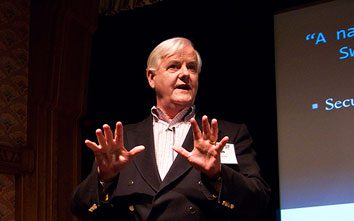Maybe individuals can be “good without God” — but can entire societies? This is one of the burning questions undergirding Os Guinness’ A Free People’s Suicide: Sustainable Freedom and the American Future. Guinness, in the tradition of Alexis de Tocqueville, is a foreign-born observer of American culture and admirer of the audacity of the American experiment. A Free People’s Suicide examines American society and its slow and disastrous drift away from its historic moorings. The following is the second (see the first) in a series of posts that feature and reflect on an interview with Dr. Guinness.
*

You refer to a “golden triangle of freedom”: freedom requires virtue, virtue requires faith, and faith requires freedom. We’ve discussed why freedom requires virtue. Does virtue really require faith? The question is often asked, “Can one be good without God?” The New Atheists are determined that the answer should be yes.
The Framers would disagree, at least when you speak of a society and not merely an individual. The Framers were very clear that every person, including every atheist, should be given freedom of conscience. But they were less sanguine about a society of atheists. John Adams comes very close to predicting postmodernism, without using the word. He describes a society that has no sense of any father to the universe, and no sense of an ultimate meaning, and he thinks such a society would bring itself down.
Put it another way: if you ask what will give you strong virtue, what is the inspiration for virtue, the content and the sanction of virtue, it’s quite clear that the strongest versions all come from some faith or another — not from atheism. We’re reaping the consequences of rejecting the realism of the Framers’ answer.
You quote Chesterton: “Men will more and more realize that there is no meaning in democracy if there is no meaning in anything, and there is no meaning in anything if the universe has not a center of significance and an authority that is the author of our rights.” How do you see the rise of the New Atheism fitting into the development you’ve described, where Americans have abandoned the Framers’ concept of liberty, and the mechanisms the Framers put in place to safeguard liberty for later generations?
I think it’s not so much the New Atheists but the rise of postmodernism in the 1960s. That’s what’s given us fiction-based beliefs. At least the New Atheists were modernists in the sense that they may have borrowed Christian ideas, but they believed in them. What you have in postmodernism is the idea that all these beliefs, including freedom, are fictions. That came in in the 1960s and that’s far earlier than the New Atheists.
What is the role of the church? You say freedom needs to be sustained, and in order to be sustained it requires a source beyond itself. One could read this book and agree with quite everything without being Christian — but on the other hand it seems like there is a very clear place for the Judeo-Christian ethic. What’s the role of the church?
I personally think that the role that the Framers saw religion supplying is not being carried out by any religious community today. In other words, you have a crisis of authority in the church itself. That’s another part of the argument in the book. It’s not the business of government, but we do have a profound crisis in the church where Christians are not doing the job the Framers thought needed doing.
This is not in the book, but let’s put it more practically. For the first time in American history, there is no Christian tradition with moral authority in public life. For most of the nineteenth century, evangelicals played a very strong role. In the 1880s that role was picked up by the Protestant mainline, and they kept it until the 1960s. Since then you’ve had a friendly competition between the Catholics and the evangelicals, but now the Catholics have lost their moral authority through the pedophile crisis. Evangelicals have lost their moral authority through the extremes of the religious right, and now we can see this massive revulsion against the religious right by the millennial generation and many others. Sadly, they’re not only dropping out from the Christian Right but from the Christian faith altogether. But the fact is that, for the first time in American history, there is no Christian tradition with moral authority in the public square.
Come back tomorrow for the remainder of the interview with Dr. Guinness. See part one of the series for more biographical information.











